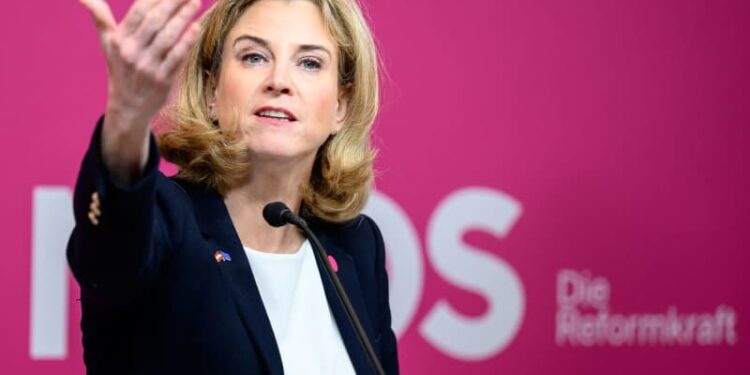The attempt to form a three-party coalition in Austria has failed after the liberal NEOS party announced its withdrawal from weeks-long coalition talks with the conservative Austrian People’s Party (ÖVP) and the Social Democratic Party of Austria (SPÖ).
NEOS leader Beate Meinl-Reisinger said on Friday that it was evident, particularly in recent days, that despite many initiatives by the liberals, the urgently needed willingness for reform was not forthcoming.
“We always had one goal: to achieve more than just the necessary,” Meinl-Reisinger said.
Since mid-November, the ÖVP, SPÖ, and NEOS – officially NEOS The New Austria and Liberal Forum – had been negotiating a government alliance. Such a coalition of three parties would have been unprecedented in Austria.
The talks were also an attempt to keep the clear election winner, the far-right Freedom Party of Austria (FPÖ), away from power. Although the ÖVP and SPÖ would also have a majority in the lower chamber, the National Council, it would only be by one vote.
Chancellor Nehammer under pressure
Chancellor and ÖVP leader Karl Nehammer faces significant pressure following the collapse of the talks.
Nehammer had ruled out cooperation with the FPÖ led by Herbert Kickl and relied on the potential three-party alliance as an alternative. Political adviser Thomas Hofer remarked that Nehammer is now “on shaky ground.”
The FPÖ feels justified in its warnings about the coalition, which it labelled a “political monstrosity of the losing centre-left coalition modelled on Germany,” according to FPÖ Secretary General Michael Schnedlitz.
The FPÖ has called for Nehammer’s resignation, accusing him of prioritizing his role as chancellor over other concerns.
New elections considered the most likely option
The most likely outcome appears to be new elections, which could result in a significant victory for the right-wing populists: Recent polls suggest an increase in FPÖ support from 29% to some 35%.
Political adviser Hofer believes Nehammer would not automatically be the top candidate, and discussions about potential candidates, including ex-chancellor Sebastian Kurz, could arise.
Liberals missed vision
Instead of a grand common vision for the country, NEOS leader Meinl-Reisinger claimed there was rather a focus on the next election date. “I am seriously concerned about competitiveness. I am seriously concerned about the situation we are in,” she said.
Similar to the now-ended centre-left coalition of the Social Democrats (SPD), Greens and liberal Free Democrats (FDP) in neighbouring Germany, financial matters became the key issue during the talks in Austria.
A sticking point in the negotiations was the planning for a new budget. Austria is in an economic crisis and must simultaneously make rigorous cuts to meet the EU criteria for financial stability. Balancing austerity with measures to stimulate the economy is considered the main task of a new government.
The ÖVP attributes the failure of the talks to the SPÖ: “The behaviour of parts of the SPÖ has led to the current situation. While parts of the Social Democrats have participated constructively, in recent days, the backward-looking forces in the SPÖ have gained the upper hand,” wrote ÖVP Secretary General Christian Stocker.
Victory for the FPÖ – but no coalition partner
Despite winning the parliamentary election, the FPÖ has no coalition partner, as other parties view FPÖ leader Kickl as unsuitable for government.
From the perspective of his political opponents, Kickl has radicalized in recent years. Since no one wanted to cooperate with the party under these circumstances, a so-called “sweetie coalition,” a reference to the party colours of turquoise for the ÖVP, red for the SPÖ and pink for NEOS, was on the table.
President Alexander van der Bellen broke with tradition by giving the ÖVP the task of forming a government even tough it was not the largest party, indicating he did not want Kickl as chancellor.
Major challenges for the new government
The tasks of a new government are immense and essentially require largely smooth cooperation. Structural problems include the pension system, which can no longer be covered by contributions. The state has to spend a large part of its annual budget to support pension payments.
Due to high wage agreements, from the perspective of the Federation of Austrian Industries, labour unit costs are barely competitive.
Unemployment stands at about 7%. This is still a lower figure compared to the time before the pandemic, but the trend is likely continuing upwards, according to Johannes Kopf, head of the Public Employment Service.
New Austria and Liberal Forum (NEOS) party leader Beate Meinl-Reisinger speaks during a press statement on the coalition negotiations in Vienna. The attempt to form a three-party coalition in Austria has failed after the liberal NEOS party announced its withdrawal from weeks-long coalition talks with the conservative Austrian People’s Party (OeVP) and the Social Democratic Party of Austria (SPOe). Max Slovencik/APA/dpa
Source link : http://www.bing.com/news/apiclick.aspx?ref=FexRss&aid=&tid=677855b640064cc583e4305da4afa943&url=https%3A%2F%2Fwww.yahoo.com%2Fnews%2Fattempt-form-three-party-coalition-181736582.html&c=1105575640897864387&mkt=de-de
Author :
Publish date : 2025-01-03 10:17:00
Copyright for syndicated content belongs to the linked Source.


